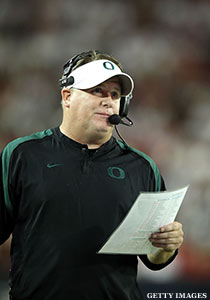
For those who know Oregon coach Chip Kelly's mannerisms, his trademark smirk was in full effect. This was during the Ducks' first real "test" this season, a home game against Arizona, and they saw their opening drive end when the Wildcats stuffed quarterback Marcus Mariota for a 4-yard loss on fourth and 1.
After the tackle, Arizona linebackers rejoiced with passionate fist pumps and jumped on top of each other like frogs mating. The Wildcats were getting the ball in field-goal range (Oregon's 35-yard line) with a chance to take an early lead on the No. 3-ranked Ducks, but more importantly, they had just won their first battle against Kelly's virtually unstoppable "Quack Attack" offense. Yet, as he paced the Oregon sideline, Kelly reeked of smugness.
Kelly had set the tone, and his demeanor made clear that he was unperturbed by the outcome of the previous play. Kelly goes for it on fourth down consistently and confidently. Oregon's players, on both sides of the ball, comprehend Kelly's strategy. The Ducks didn't convert, but they didn't care, because they knew the following equations would hold true:
Oregon's next fourth-and-short came late in the second quarter when the Ducks faced a fourth-and-2 on their own 34-yard line. Kelly went for it again, and this time Kenjon Barner ran for six yards and a first down. Oregon went on to a 16-play scoring drive that ate up all but 28 seconds of the first half and totally deflated Arizona's defense. Oregon went on to score 36 points in the second half en route to a 49-0 win.

Those fourth down calls epitomize Kelly's aggressiveness but what the average football fan doesn't realize is that Chip's play-calls (the fourth down tries, fake punts, two-point conversions, etc.) are almost always the correct mathematical decision. Like Paul DePodesta and Billy Beane did in baseball, Kelly's genius comes from exploiting arithmetic that other coaches are too naïve to acknowledge.
Six years ago, Chip Kelly was the offensive coordinator at the University of New Hampshire. In January, the Tampa Bay Buccaneers fired coach Raheem Morris and targeted Kelly as his replacement. Although Chip turned down the Bucs' offer because he had "unfinished business" at Oregon (read: national championship), Kelly's ascent through the coaching ranks has been nothing short of extraordinary. From an assistant at a Division I-AA school to turning down an NFL head coaching job in six years. Not bad, Chip. Not bad.
It's a shame Kelly didn't take his talents to Tampa because he would have single-handedly changed the way the NFL game is played by this point in the season. He'd turn the focus away from concussions and make people realize that football is a chess match, a game of strategy, and when played correctly, a beautiful thing.
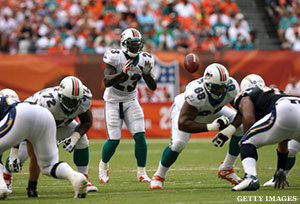
Here's an example of how the NFL works. The Miami Dolphins were 1-15 in 2007 and started off the '08 season 0-2. In Week 3, they instituted the Wildcat offense, finished 11-3, and made the playoffs. Pundits argued that the Wildcat was a gimmick, that defenses would adjust, that it would never last, and they were partially right. Defenses did adjust, yet somehow, five years later, more than fifty percent of NFL teams have a version of the Wildcat in their playbook.
Why does this matter? Because when something catches on in the NFL, everyone jumps on the bandwagon. At first they refute it, call it a fluke, and then eventually, when a team wins 11 out of 14 games after losing 17 of its previous 18, they realize that there might be something to the newfound strategy and hurry to insert into their playbooks. The NFL is a cat and mouse league.
This is how and why Chip Kelly will modernize the game in the same way that Billy Beane's triumphs showed baseball executives that getting on base is more important than batting average. Soon enough Kelly will take over an NFL team. (A national championship is possible this season, but those Bama boys are a different breed and that Saban fella is a pretty incredible coach in his own right.) Whenever Kelly does enter the league, he'll play the game aggressively, with "aggressively" meaning in a mathematically logical fashion. By the end of the season every coach will be going for it on fourth down, attempting fake punts, fake field goals, two-point conversions, and they'll likely do all of this oblivious to the fact that there's astounding mathematical evidence supporting the decisions they're making.
They'll just see Chip Kelly's team lighting up the scoreboard and follow suit because … well, 90 percent of NFL coaches are followers.

The fact that the league has ignored such rudimentary math for so long and that the average team's miscalculations account for approximately one loss per year (we'll get to that later) is mind-boggling. How has there not been a revolt? How have millions of fans watched silently as NFL coaches, refusing to stray from orthodoxy, continually punt away games (pun very much intended)? How has there not been a boycott?
These men are at the height of their profession and haven't utilized information that's been available for more than 10 years. It's the same exact thing that happened in baseball, but in this case, Bill James comes in the form of astrophysicist Chuck Bower and his partner Frank Frigo.
Frigo and Bower invented the Zeus computer program, which takes fourth-down situations such as the ones Oregon had against Arizona, and and runs them to conclusion as many as a million times to determine the optimum play-call. The system incorporates the teams' characteristics, ball position, yards to first down, clock, and timeouts. Needless to say, these guys are smart.
Complex algorithms aside, the outcomes are incredibly simple. Zeus tells us that teams should almost always go for it on fourth and short, attempt more onsides kicks, go for two-point conversions, in other words, do all the things that Chip Kelly does on a routine basis.
But the most important thing to take away from Zeus' findings is that the math isn't even close. The numbers are so overwhelming that teams that kick field goals on fourth and short at the 20-yard line aren't just wrong, they're so wrong it's ludicrous. For the Texas Hold ‘Em players out there, kicking a field goal in that situation is like folding pocket aces pre-flop against a smaller pocket pair. You're conceding when you're the overwhelming favorite. Even if the guy hits his set and wins the hand, you don't have any regrets. You know you made the right call and that you'll win the hand a majority of the time. NFL teams kick the field goal and "take the points" virtually every time when in reality a field goal kicker (like a punter) should only be used in times of desperation. When it's fourth and 15, for example.
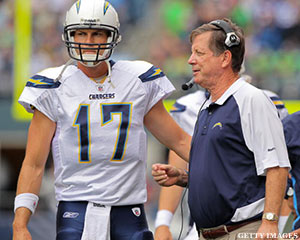
Note: Zeus breaks down its calculations into GWC or "Game Winning Chance." By going for the field goal in the previous example -- fourth and 1 at the 20-yard line -- a team decreases its chances of winning by X percent. Since there are so few offensive plays in the average game (usually around 70-90 depending on the team) every punt or field goal attempt chosen incorrectly can have a profound effect on the outcome of the game.
Here's an example of how the abstract concept of "momentum" carries far more weight with NFL authorities than concrete mathematics.
It's the first round of the 2009 AFC playoffs and the Chargers have a 7-0 lead against the Jets. The Chargers have fourth and inches at their own 47-yard line with a little more than nine minutes left in the 2nd quarter.
What does Chargers coach Norv Turner decide to do? He decides to punt of course! And the Chargers, as you may remember, had one of the best offenses in the league that season, not to mention that Philip Rivers, or any other quarterback for that matter, can convert a 6-inch sneak 99 percent of the time.
From what you just read, you're fully aware this was a preposterous decision, but Phil Simms, who was announcing the game, pontificated for several minutes that Turner made the right call because the Chargers couldn't risk losing momentum. He wouldn't stop talking about the importance of momentum and how the Chargers would instantly lose it, whatever "it" may be, had they gone for the first down and not converted. No mention of the momentum that would have been created had the Chargers converted the fourth down, which they would have done easily.
In Phil's eyes, those handsome blue eyes, Turner's call was undoubtedly the right one, and the fact it didn't work out – San Diego didn't score again until the fourth quarter after falling behind 17-7 -- was unlucky. The trouble with luck, cousin to momentum, brother to coincidence, is that there's no way to calculate it.
Rex Ryan, a man's man, not afraid of fourth and short (or sticking his foot in his mouth), would jam the decision down Turner's throat when he converted on fourth and 1 at the end of the game. Thomas Jones rewarded the logical strategic move with a 2-yard run.
But really, both decisions were no-brainers. Just one guy is less of moron.
In addition to the NFL's ineptitude on fourth down, the game's infuriating conservatism trickles down into all play-calling aspects of the game. In 2009 ESPN the Magazine offered this statistic: In college football that year, the kicking team had recovered 63 percent of onsides kicks when the receiving team was expecting a normal kickoff (the "hands" team wasn't on the field).

The Saints won the Super Bowl that season because they started off the second half with an onsides kick recovery. It was a brilliant call by Sean Payton, who along with Bill Belichick, are the two NFL coaches who appear to have a fairly firm grasp on football's mathematics. In fact, Belichick met with Frigo and Bower shortly after they invented Zeus, but passed on purchasing the super computer's services. My guess is that Bill got all the information he needed during their meeting, namely, that the math says to go for it on fourth and short, a decision he's made repeatedly throughout his brilliant tenure in New England.
What Zeus tells us with undeniable statistical evidence is that teams are costing themselves possessions, points, and most importantly, wins, by ignoring the math inside the game. Although Kelly is the standard for strategic brilliance, it's important to note that USC coach Lane Kiffin possesses the same aggressiveness.
USC has been a huge disappointment this season. But given its personnel and Kiffin's propensity to make the correct call on fourth down (despite being a horrendous play-caller in general), at least the Trojans won't sacrifice any chance of winning Saturday, when the Trojans host the Ducks, due to mathematical naïveté.
In fact, assuming the Ducks play Alabama in the BCS national championship game, which I believe will be the case, the Ducks "Game Winning Chance" could increase fairly significantly due to Kelly's refusal to give up the ball. It hurts to diminish Nick Saban in any way because he's by far the best recruiter/defensive mind/man-molder of anyone else in the business, but if he has a weak link against Oregon, it's that he won't entrust McCarron and new offensive coordinator Doug Nussmeier (who's fantastic) in fourth and short situations. He'd rather punt it away and play defense. Enough conversions by the Ducks and punts by the Tide might make that game far more interesting.
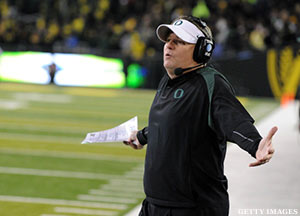
If you're an NFL fan, think about all the games you've watched in your lifetime that have been botched by dumb coaching. How many real and fantasy football games have you or your favorite team lost because guys like Norv Turner, Phil Simms, and other so-called "experts" preach about momentum rather than mathematics?
Perhaps the most glaring offseason example of the NFL's conformist nature came from the Jacksonville Jaguars. The Jags spent a third-round pick (very valuable for any NFL team) on Cal punter Bryan Anger, essentially saying that they expect their offense to be incompetent. So for all you Jacksonville fans out there, all 12 of you, I wonder how it feels knowing that your team cannot wait to punt the ball. Shahid Khan seems like a pretty smart guy. I hope he reads this and sends the Jags in a different direction. I'd assume they'd sell more tickets if they cut their punter, traded for Tebow, and did what Kevin Kelley did at Pulaski High.
That's the best part about the math: It says that NFL games are far too conservative. It says that coaches need to loosen up, air it out, embrace creativity.
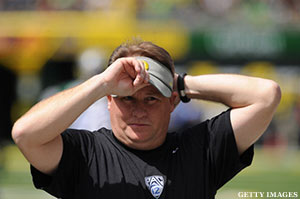
This is why the NFL needs Chip Kelly.
In the meantime, if you're a football fan, and your team kicks a field goal on fourth-and-1 on the 25 yard-line, leave the stadium and don't come back. That decision, which happens in almost every NFL game on a weekly basis, is the equivalent of an MLB manager starting a guy with a .300 On-Base Percentage instead of a guy with a .400 On-Base Percentage because the guy with a .300 OBP is 6-5 with great shoulders and a handsome smile.
Baseball had its "Moneyball" revolution. The NFL will too, but first, Chip Kelly needs to win a national championship.
All I can say is, go Ducks.
-- Tim Livingston was a mediocre college baseball player and previously worked at the NFL Network. Email him at timlivingston0sports@yahoo.com.








